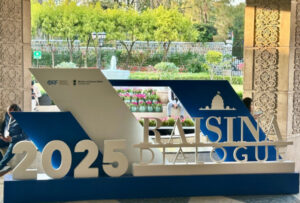From 17-19 March 2025, the Raisina Dialogue – India’s premier multilateral conference on geopolitics and geoeconomics – took place for the 10th time. Dr Axel Berger represented IDOS in a number of formal events and informal meetings.
The concept of “Kālacakra“– “or eternal time envisaged as a moving wheel, with cycles of life, destruction, rebirth and rejuvenation” – was chosen as the theme of the conference. It served to emphasise the ambition to take up the rapid and drastic shifts the world currently observes “in their continuity and discontinuities”, as put forth by Foreign Minister Dr S. Jaishankar in his message to the Dialogue.
With six thematic pillars on geopolitical shifts, green economy, digital planet, trade & supply chains, the future of development, and investment in peace, the conference brought into dialogue heads of state, ministers, and local government officials with actors from the private sector, science, civil society, and the media.
Dr Axel Berger represented IDOS at the Raisina Dialogue in a number of formal events and informal meetings. As a speaker on the Panel “Blue Economy: Balancing Prosperity, Sustainability and Resiliance”- moderated by Director Ambika Vishwanath (Kubernein Initiative, India) – he spoke on the importance of the agreement on fisheries in the framework of the World Trade Organization. This agreement, agreed in 2022, and a more stringent follow-up agreement is important in order to curb harmful subsidies that lead to overfishing and a destruction of biodiversity while safeguarding the livelihoods and economic prospects of fishermen in developing countries. Together with the other panellists Kekeli Ahiable (Trade and Infrastructure Advisor, Tony Blair Institute for Global Change, United Kingdom), Teenah Jutton (Former Member of Parliament, Mauritius), Thilan Wijesinghe (Chairman & Managing Director, TW Corp (Pvt) Ltd, Sri Lanka), and Suthikorn Kingkaew (Advisor, Hydrogen Economy Project, Energy Policy and Planning Office, Thailand), he made the case for strengthening North-South science partnerships to address transboundary ocean challenges and take up shared responsibilities.

